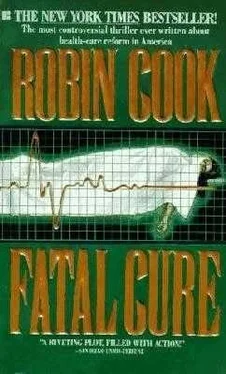"I'm getting the feeling that finding out who killed Hodges won't be easy," Angela said.
"You don't know how right you are," Paul said. "There's a second chapter to the Hodges-Van Slyke affair. Hodges was friends with Traynor who is the present chairman of the hospital board. Traynor's sister was married to Van Slyke, and when Hodges finally denied Van Slyke privileges…"
"All right," Angela said, holding up her hand, "I'm getting the idea. You're overwhelming me. I had no idea the town was quite this byzantine."
"It's a small town," Paul said. "A lot of families have lived here a long time. It's practically incestuous. But the fact of the matter is there were a lot of people who didn't care for Hodges. So when he disappeared, not too many people were broken up about it."
"But that means Hodges' murderer is walking around," Angela said. "Presumably a man who is capable of extreme violence."
"You're probably right about that."
Angela shivered. "I don't like it," she said. "This man was in my home, maybe many times. He probably knows my house well."
Paul shrugged. "I understand how you feel," he said. "I'd probably feel the same way. But I don't know what you can do about it. If you want to learn more about Hodges, go talk to Barton Sherwood. As president of the bank he knows everyone. He knew Hodges particularly well since he's been on the hospital board forever and his father had been before that."
Angela went back to her office and again attempted to work, but she still couldn't concentrate. It was impossible to get Hodges out of her mind. Reaching for the phone, she called Barton Sherwood. She remembered how friendly he'd been when they bought the house.
"Dr. Wilson," Sherwood said when he came on the line. "How nice to hear from you. How are you folks making out in that beautiful house of yours?"
"Generally well," Angela said, "but that's what I'd like to chat with you about. If I were to run over to the bank, would you have a few moments to speak with me?"
"Absolutely," Sherwood said. "Any time."
"I'll be right over," Angela said.
After telling the secretaries that she'd be back shortly, Angela grabbed her coat and ran out to the car. Ten minutes later she was sitting in Sherwood's office. It seemed like just yesterday that she, David, and Nikki were there, arranging to buy their first house.
Angela came right to the point. She described how uncomfortable she felt about Hodges having been murdered in her house and about the murderer being on the loose. She told Sherwood she hoped he would be willing to help.
"Help?" Sherwood questioned. He was leaning back in his leather desk chair with both thumbs tucked into his vest pockets.
"The local police don't seem to care about solving the case," Angela said. "With your stature in the town a word from you would go a long way in getting them to do something."
Sherwood thumped forward in his chair. He was clearly flattered. "Thank you for your vote of confidence," he said, "but I truly don't think you have anything to worry about. Hodges was not the victim of senseless, random violence or of a serial killer."
"How do you know?" Angela asked. "Do you know who killed him?"
"Heavens no," Sherwood said nervously. "I didn't mean to imply that. I meant… well, I thought… there's no reason for you and your family to feel at risk."
"Do a lot of people know who killed Hodges?" Angela asked, recalling David's theory of down-home justice.
"Oh, no. At least, I don't think so," Sherwood said. "It's just that Dr. Hodges was an unpopular man who'd hurt a number of people. Even I had trouble getting along with him." Sherwood laughed nervously, then went on to tell Angela about the spit of land that Hodges had owned, fenced, and refused to sell out of spite, keeping Sherwood from using his own two parcels.
"What you're trying to tell me is the reason no one cares who killed Hodges is because he was disliked."
"Essentially, yes," Sherwood admitted.
"In other words, what we have here is a conspiracy of silence."
"I wouldn't put it that way," Sherwood said. "It's a situation where people feel that justice has been served, so no one cares much whether someone is arrested or not."
"I care," Angela said. "The murder took place in my house. Besides, there's no place for vigilante justice in this day and age."
"Normally I would be the first to agree with you," Sherwood said. "I'm not trying to justify this affair on moral or legal grounds. But Hodges was different. What I think you should do is go talk with Dr. Cantor. He'll be able to give you an idea of the kind of animosity and turmoil that Hodges was capable of causing. Maybe then you'll understand and be less judgmental."
Angela drove back up the hill toward the hospital feeling confused about what she should do. She did not agree with Sherwood for one second, and the more she learned about the Hodges affair, the more she wanted to know. Yet she did not want to speak with Cantor, not after the conversation she'd had with him the day before.
Entering the hospital, Angela went directly to the section of the pathology lab where slides were stained and prepared. Her timing was perfect: slides that she'd been anticipating that morning had just been completed. Taking the tray, she hurried back to her office to get to work.
The moment she entered her office Wadley appeared at the connecting door. Like the day before, he was visibly distressed. "I just paged you," he said irritably. "Where the hell were you?"
"I had to make a quick trip to the bank," Angela said nervously. Her legs suddenly felt weak. She feared Wadley was about to lose control the way he had the day before.
"Restrict your visits to the bank to your lunch hour," he said. He hesitated for a moment, then stepped back into his office and slammed the door.
Angela breathed a sigh of relief.
Sherwood had not moved from his desk following Angela's departure. He was trying to decide what to do. He couldn't believe this woman was making such a issue about Hodges. He hoped he hadn't said something that he would regret.
After some deliberation, Sherwood picked up the phone. He'd come to the conclusion that it was best for him to do nothing other than pass on the information.
"Something has just happened that I thought you should know about," Sherwood said when the connection went through. "I just had a visit from the newest member of the hospital's professional staff and she's concerned about Dr. Hodges…"
David finished with his last office patient for the day, dictated a few letters, then hurried over to the hospital to make his late afternoon rounds. Fearing what he'd find, he left Mary Ann Schiller for last. As he'd intuitively suspected, she'd taken a turn for the worse.
Her low-grade fever had gradually climbed during the afternoon. Now it hovered a little over one hundred and one. The fever bothered David, especially since it had risen while she was on antibiotics, but there was something that bothered him more: her mental state.
That morning Mary Ann had been drowsy, but now as David tried to talk to her, he found her both drowsy and apathetic. It had been a distinct change. Not only was it hard to wake her and keep her awake, but when she was awake she didn't care about anything and paid little attention to his questions. She was also disoriented with respect to time and place although she still knew her name.
David rolled her on her side and listened to her chest. When he did so he panicked. He heard a chorus of rhonchi and rales. She was developing massive pneumonia. It was like John Tarlow all over again.
David raced back to the nurses' station where he ordered a stat blood count as well as a portable chest film. Going over Mary Ann's chart he found nothing abnormal. The nurses' notes for the day suggested that she had been doing fine.
Читать дальше












